Going to Mafia Island was a spur-of-the-moment decision and one of the best we’ve made. We were going to Malawi but decided to go to Tanzania as an add-on to our Malawi trip since it was just a little bit extra to get there from Malawi. Mafia Island and its reefs are renowned as an excellent, world-class diving destination.
Mafia Island ("Chole Shamba") is an island in Tanzania. The name "Mafia" derives from the Arabic morfiyeh, meaning "group" or "archipelago", or from the Swahili mahali pa afya, meaning "a healthy dwelling-place".
See our next trip to Mafia Island
Getting There
Mafia Island is located in the magnificent southern circuit of Tanzania and Zanzibar and is part of a fascinating array of parks, wildlife reserves and Indian Ocean islands.
Catch a flight out of Johannesburg to Dar Es Salaam, from there you take a small aircraft to the island. A short 30-minute flight over the impossibly blue ocean, so clear you are almost certain that you can see the whale sharks from the plane.
Dar Es Salaam City
We ended up being happy with our decision to stay in the city and experience the bustling city vibe, although short, it gave us a feel for the country and its people. Like many African countries, the Tanzanians are friendly and welcoming. The city comes to life at night and is quiet during daytime hours because of the soaring temperatures. Our helpful taxi driver who met us at the airport was telling us about his country with so much pride. We zipped through the traffic to get to the hotel in true African style. With the beep beeps of car horns all around, dodging scooters and pedestrians left and right. But somehow there's order in the chaos, it just works.
There are great places to visit in the city, have a taste of the local food, do some shopping, walk around, take in the sights and smells and mingle with the people. Whether it’s roasted maize or mama cooked Tanzanian chapatis, you won’t want to miss a few meals and snacks of Tanzanian street food when you visit Dar Es Salaam.
You can visit the local market; this is the place to go if you are hunting for the best bargains in town or wish to see the authentic side of local-style Tanzanian shopping. If you want to learn more about the history and culture of Tanzania or see some of the fossils that have been uncovered in the country, you’ll be interested in visiting the National Museum. The Village Museum offers a chance to observe some typical Tanzanian traditional huts and learn more about the tribes of the country.
Mafia Island
The next day we were off on the tiny plane to the island. Looking down at the deep blue ocean below scattered with little islands, I wonder what adventure awaits, and feel the excitement building in my belly.
Large areas of the island – especially the south and northern sides – are covered with coconut trees, mostly planted by pre-World War II German settlers and descendants of Omani Arab, Shatri, Shirazi, and Baluchi pioneers. These provide work for many inhabitants and a source of income, especially during the dry season when most coconuts are harvested and home-grown food is in short supply.
The dive resort is a lovely place situated in the Mafia Island Marine Park in Utende, in the southeast of Mafia Island. It has a beachfront location with uninterrupted views over Chole Bay.

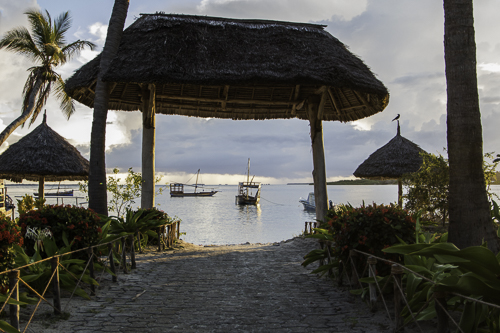
The pace of life here is very slow and makes this a great getaway. You can sit for hours taking in the beautiful scenery and listen to the peaceful flop, flop, sound of the water or watch the cute little ghost crabs digging their holes in the sand.
Scuba Diving
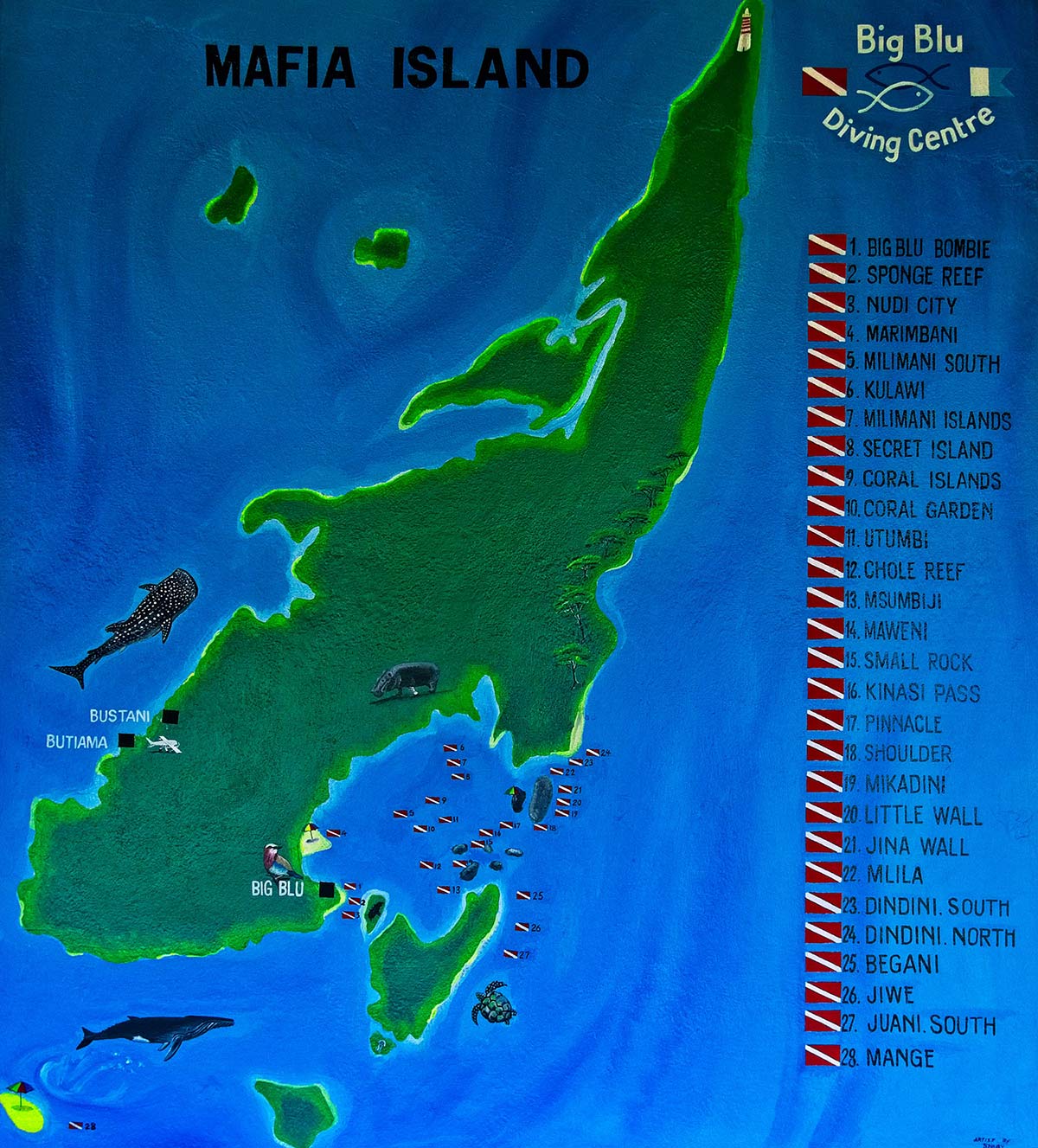
The Mafia Island region, which includes the Rufiji River Delta and Mafia channel, forms one of the finest complexes of estuarine, mangrove, coral reef, and marine ecosystems in the world, all lying in an area of around 1500km². The coral reefs are particularly diverse in Eastern Africa. Habitats in the area include hard-coral dominated reefs, soft-coral, sheltered back reef systems, intertidal flats with a hard and soft substrate, mangrove forests, and extensive seagrass beds. The average sea temperatures are min 26.5°C and max 29.4°C.
Experience Level
There's something here for everyone, from snorkelers to seasoned scuba divers; there will be a dive spot to suit your experience level. However, if you are Open Water qualified, we always suggest that divers get their Advanced Diver certification. This ensures that you feel more comfortable in the water and can dive to deeper depths, not placing limits on your diving.
Muck Diving
On our first day, we went on a lovely, relaxed 84-minute muck dive to see all sorts of interesting tiny creatures. When you first submerge, you just see sand and patches of what seem to be leaves and sea grass bunched up together. Not something I would think much of, looks like a pile of dirt that should wash up on the shore soon. Until you take a closer look. Suddenly, realising that these balls of dirt have all sorts of wonderful little gems hanging around them like tiny frogfish, seahorses, ghost pipefish, and harlequin shrimps, it’s an amazing macro photography dive.
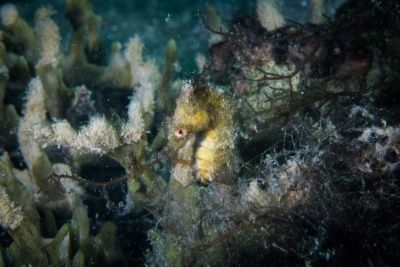
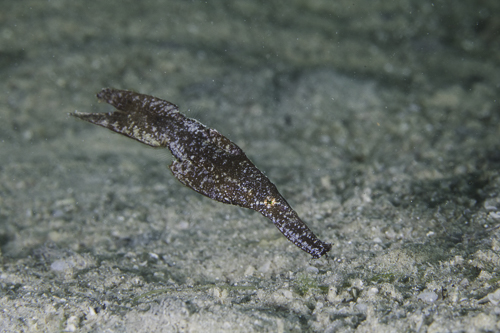
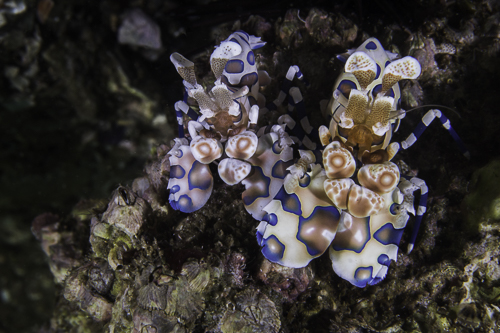
Shore Diving and Snorkeling
Shore dives or snorkeling can be done right in front of the resort, where you will see all sorts of marine life. We almost immediately bumped into a little rocky reef with a lovely sea anemone occupied by clownfish and different shrimps and small eels hiding in the crevices and lionfish hanging around. You can also travel by Dhow to one of the many locations available for snorkelling in the area.
Boat Diving
We had 2 boat dives scheduled every day except for the two days we booked other excursions. Going out on the wooden boats is fun and comfortable, compared to the rubber duck boats we are used to. We did double tank dives, which meant our surface interval was spent on the water, just chilling on the boat, warming up for the next dive. Enjoying some drinks and snacks, chatting with the interesting people we met, or even sneaking in a little catnap.
https://www.youtube.com/watch?v=9CjEYgUXXto&list=PL1I95LKLZKZwGFn5Xp5-liTT0V2FHx1T-&index=2&t=0s
There are shallow and deep reef dives with a wonderful diversity of marine life. There are a multitude of different kinds of coral, including giant table corals, huge stands of blue-tipped staghorn corals, and more than 400 species of fish. You'll always see something exciting, from clownfish to octopus, rays, and the odd gigantic grouper or large potato cod. Sharks and dolphins are found in the deeper waters, and at night, turtles haul themselves onto remote beaches to nest.
Whale Sharks
Snorkelling with the whale sharks of Mafia Island is the highlight of the trip!
It's a short ride to the west side of the island, where you go out on a Chachungi speedboat along the channel between Mafia Island and the mainland. During the summer season, usually from October to March, the whale sharks can be spotted swimming at the surface.
Whale sharks are filter feeders, primarily feeding on plankton, small fish, and other microscopic organisms. Despite their enormous size, whale sharks are gentle giants that feed by swimming with their mouths wide open, filtering large volumes of water to extract their prey. These beautiful giants can grow up to 20m long.
https://www.youtube.com/watch?v=4X9LO4trEao&list=PL1I95LKLZKZwGFn5Xp5-liTT0V2FHx1T-&index=2
Mafia Island follows the “Code of Conduct,” which is a set of guidelines used all over the world in interacting safely with marine animals. The income that is created by marine tourism is pivotal in the conservation of the whale sharks of Mafia Island.
We were lucky enough to have met Simon J Pierce on our first trip. He is the co-founder and whale shark researcher at the Marine Megafauna Foundation, and we attended his talk on whale sharks. Raising awareness is key, as well as working with the local communities and accommodating their livelihood and concerns in conservation.
Chole Island Excursion
Chole Island is one of the oldest inhabited islands in the Mafia archipelago. It has a long, varied history dating back to the 12th Century and was once the capital of Mafia Island.



On this tour, you explore the ruins that have been overtaken by nature and see the Arabic and German historical influences, including a prison and customs house. Walking across the entire island through the small villages and varied vegetation allows you to meet locals and see the village life. Along this walk, there are impressively large Baobab trees, and you can see where traditional Swahili dhows are built by skilled craftsmen using hand tools.
Flying Foxes
Chole also acts as a sanctuary for the Flying Fox, also known as fruit bats, which are known for their primarily herbivorous diet, consisting mainly of fruits, nectar, and pollen. You can hear the squeaks of the bats as you get closer to the very tall trees that they live in. Looking up, you see many of them hanging like ripe fruits from the branches. They rely heavily on their sense of smell to locate food, and they have large eyes which they use to navigate.
Flying foxes play a crucial role in pollination and seed dispersal. As they consume fruits, they deposit seeds in different locations, contributing to the regeneration of forests.
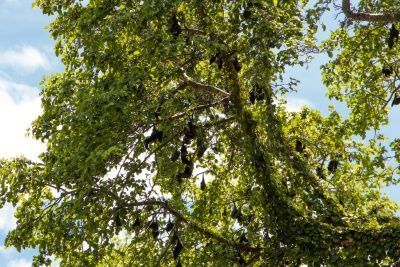


Flying foxes are nocturnal, and their feeding typically occurs during the night. As dusk descends upon this tropical paradise, witness the skies come alive with the mesmerizing flight of these giant fruit bats. With wingspans stretching up to a meter, the flying foxes gracefully soar through the twilight, creating an otherworldly display against the backdrop of the setting sun.
This is a place you won't soon forget.
Keep an eye out for our next trip to Mafia Island.

by Madelein Wolfaardt















































